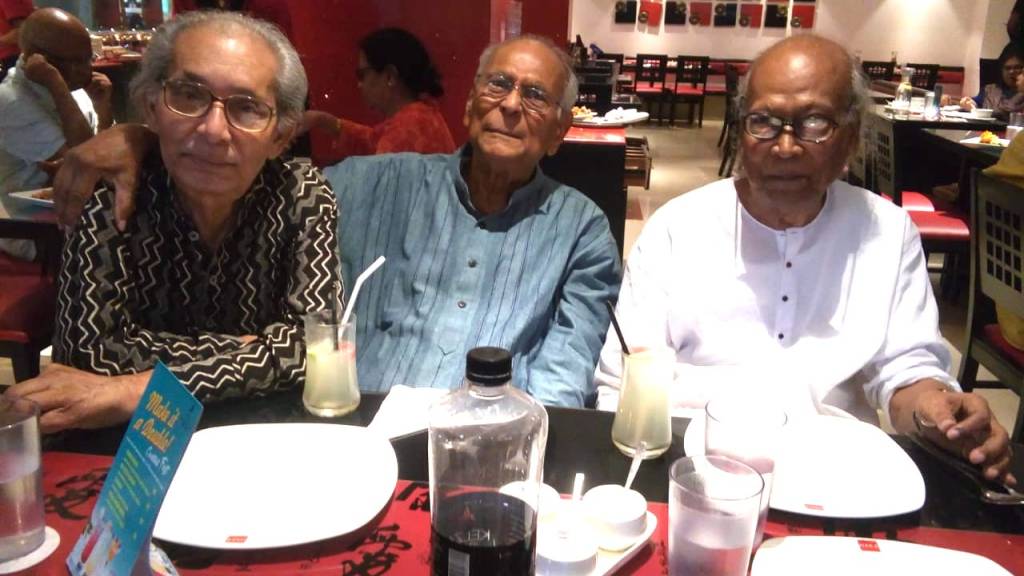Dr. C. K. Basu

Childhood friends, gathering in Kolkata after several years:
Batakrishna Dey (left) with Dr. C.K. Basu (center) and distinguished poet Shankha Ghosh (right)
Bata and I first met in History class in the year 1945. I remember our teacher Kali Babu walking into the classroom. Immediately, he saw his new students, Bata and I chatting away very lively. He pointed at us, in a loud voice. He said, Don’t talk, be silent! Bata and I just giggled in response to him. That was the beginning of our friendship, which has remained solid and steadfast for the last 75 years.
On August 15, 1947, Jawaharlal Nehru became the first Prime Minister of India with his Declaration of Independence from British rule. The years 1946 through 1949 were a turbulent time in India defined by division. There was sporadic violence after the Independence. There were riots among Hindus and Muslims. I remember people arriving from across the border, refugees who fled to the country. The Mitra Institution, a heritage school, in Calcutta is located in the center of the city. I remember Calcutta in 1947 and it was an almost famine-like situation in the country. In that time, Bata came from East Bengal to Calcutta to begin his studies at the Mitra Institution.
When we were students at the Presidency College, we had a small group of friends, Bata, Atin, Durga, Sankar, Sankha, Bhavesh, myself and our friend Hiren. Most of our time outside of class was spent at the College Street Coffee House on Bankim Chatterjee Street near the Sarada Book Stall. The College Street Coffee House would become famous for its adda sessions and as a meeting place for culture, politics, personalities and movements.
Adda is a quintessential Bengali experience of conversation, coffee and community. Some regular patrons of the famous Coffee House over the decades have been: Satyajit Ray, Amartya Sen, Mrinal Sen, Ritwik Ghatak, Narayan Gangopadhyay, Sunil Gangopadhyay, Sanjeev Chattopadhyay, Samaresh Majumdar, Subhas Mukhopadhyay, Shakti Chattopadhyay, Craig Jamieson, Sukhamoy Chakraborty, Tapan Raychaudhuri, Barun De and Sumit Sarkar, Malay Roy Choudhury, Samir Roychoudhury. If we were not having chats at the Coffee House, we could be found at the Dilkhusa Cabin on Mahatma Gandhi Road near College Square. The 118-year-old Dilkhusa Cabin is now known as a heritage restaurant.
During our college years, we would travel as a group to many places including Puri, Darjeeling, Bistupur and Shantiniketan. I remember some very funny stories from these travels. Bata was very charming and sometimes even childlike. I remember Bata was very afraid of ghosts! Perhaps he was pretending or maybe he was a little fearful of spirits and darkness. Truly memorable among these stories was the imaginary ghost we called the Chamdi Bhoot. On a trip to Darjeeling, we got a chance to really pull his leg with a good joke. Our friend Hiren told a story about a Chamdi Bhoot who lived in the town of Darjeeling at the foothills of the Himalayas. A bhoot or a bhuta is a supernatural being or creature who can change form and who haunts the living. They might float or wear entirely white or have altered feet. Many ghost stories are deeply woven through the folklore of India.
We all joined in Hiren’s tale of the Chamdi Bhoot, making a hissing sound in the background for special effects. Then Hiren entered the room as the floating Chamdi pretending to increase the eerie and spooky effect. Bata was very frightened! He hid under his blanket and pleaded with us to save him from the Chamdi Bhoot! There was no end to the fun we had in all these excursions. In these years of our youth, Bata was always writing his songs and poems. It was a productive and prolific time of creativity for him. He was published in many prestigious literary magazines. His songs were composed and recorded by well-known artists. I remember fondly this time of laughter, travels and tremendous friendship.
I remember a story of us walking on the beach. We were on a trip with our friends to Puri, a city in the state of Odisha near the Bay of Bengal in Eastern India. We were talking about the beauty of the sand and the ocean. Bata said, “I will make it more beautiful.” He took a stick he found and he wrote a song in the sand with it. He wrote in Bengali: Ai Sagar Belaye jhinuk khojar Chale gaan geye parichoy Ogo geetimoy. The words he wrote in the sand described the sea, the oysters, music and a deep love for nature. He was very creative and spontaneous! Bata wrote other songs that day sitting on the beach, watching the sun set over Puri.
I remember a story of when Bata and I were travelling on a bus to South Calcutta. We were traveling to watch a newly released film. Bata has always loved films and the music of cinema. The bus that day was not very crowded. We heard a young boy whistling the tune of a song. On listening carefully, we realized that it was one of Bata’s hit songs. This brought a smile to our lips. Since his songs had become very popular, we came across people singing them every now and then on our travels. We would also hear them on the radio frequently which was very joyful to us.
In the 1970s and 1980s, I was in the country of Bangladesh on a UNESCO assignment. UNESCO is an agency and a cultural organization that is part of the United Nations. It promotes world peace and security through international events and relations in education, the sciences, and culture. Bata, Uma and Jhoomi came to visit us in Bangladesh for a few days. We drove from the Indian border to the city of Dhaka by car. We drove north through the lush green countryside. It was very nostalgic for Bata to visit the countryside and the land of his birth and childhood. We had a great time together on that long drive. I remember the beautiful Jhoomi caught the eyes of all my Bangladeshi friends. We all enjoyed our time together on this visit to Dhaka.
I remember many stories of Batakrishna Dey, my friend of over 75 years. Batakrishna Dey was a brilliant student in Calcutta at the Mitra Institution and at the Presidency College during a truly fascinating time in India’s history. I remember him as a romantic Bengali poet and as a distinguished civil servant in the government of India. He was a loving husband to his wife Uma whom he married in 1956. He is a devoted father to his daughter Sreyashi whom he loves madly and abundantly. For me, Bata has remained one of my closest friend after all these years.
Now, these days Bata and I are both retired and we are living in the global crisis of the Covid-19 darkness. The highlights of our days come from reminiscing. We remember the past and we tell old stories about our friends and family. We remember all the little things and the big things. When we connect by sharing chats on WhatsApp, we reminisce about happy times and our many adventures. I am grateful for many memories and over 7 decades of beautiful friendship.
